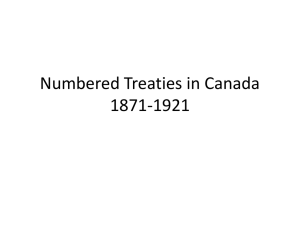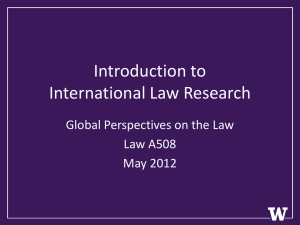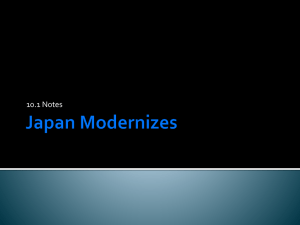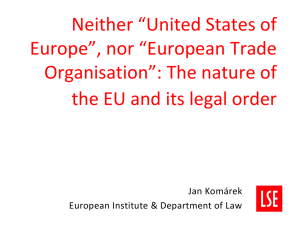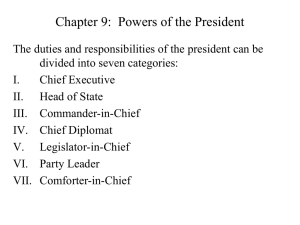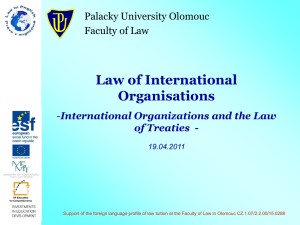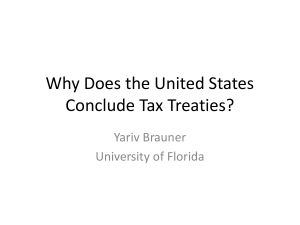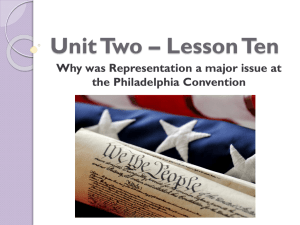Treaties and Sanctions - Firestone Library
advertisement
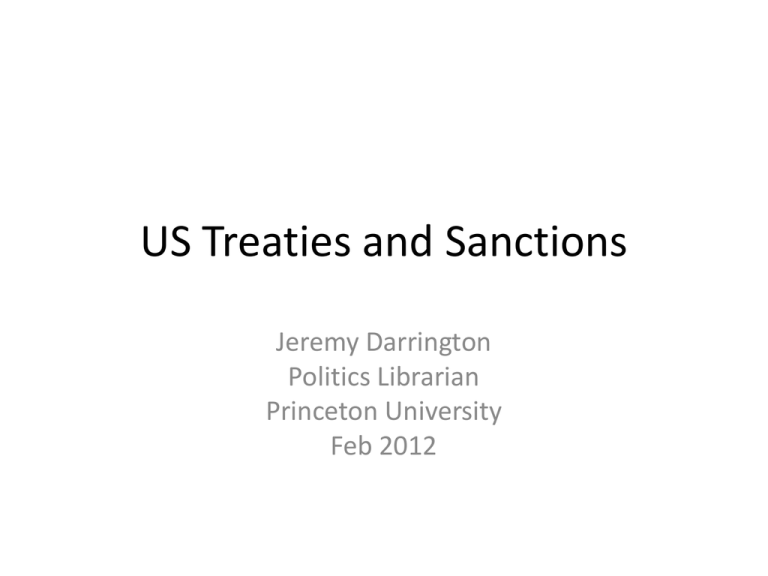
US Treaties and Sanctions Jeremy Darrington Politics Librarian Princeton University Feb 2012 Treaties • Go by lots of names (conventions, agreements, covenants, final acts, charters, protocols, pacts, accords, etc.), but same effect • From US perspective, difference between treaties and executive agreements – Treaties are subject to “advice and consent” of Senate; exec agreements aren’t (but often based on Congressional approval or a previously ratified treaty) – May lead to differential treatment in domestic courts* • From perspective of international law, both are binding * See Kirgis, Frederic. 1997. “International Agreements and U.S. Law,” ASIL Insights, http://www.asil.org/insigh10.cfm for a discussion of the domestic law treatment of various international agreements Treaty-making process • Secretary of State authorizes negotiation Source: AP images, ID#090416027366 Treaty-making process, cont’d. • U.S. representatives negotiate Source: AP images, ID#8806010123 Treaty-making process, cont’d. • Agree on terms, and upon authorization of Secretary of State, sign treaty Source: AP images, ID#01090801788 Treaty-making process, cont’d. • President submits treaty to Senate Source: AP images, ID#97042302065 Treaty-making process, cont’d. • Senate Foreign Relations Committee considers treaty and reports to Senate Howard Baker and Senate Foreign Relations Committee members discussing SALT II Source: AP images, ID#7911090988 Treaty-making process, cont’d. • Senate considers and approves by 2/3 majority Source: http://www.politico.com/news/stories/1210/46724.html Treaty-making process, cont’d. • President proclaims treaty is ratified Source: AP images, ID#100831160211 Finding treaties • Start with one of the several good guides available: – http://library.law.columbia.edu/guides/Guide_to_ Treaty_Research – http://firestone.princeton.edu/law/treatyrg.php (based on above, but with PUL info; a little dated) – http://www.llrx.com/features/ustreaty.htm (a little dated, but still helpful) Finding treaties—official • Official US publications – United States Treaties and Other International Agreements (UST) KZ235.3 .U5582 (1950-1984) • Official full text; time lag of about 15+ years – Treaties and Other International Acts Series (TIAS) • First official full text version (“slip” treaties); time lag of 25(?) years; some published online at State Dept’s website: http://www.state.gov/s/l/treaty/tias/index.htm – Treaties in Force (TIF) • State Dept. annual index listing all the treaties currently in force; bilateral by country, multilateral by subject – All available through HeinOnline Finding treaties—unofficial • For subject access to bilateral treaties in force, use Kavass’s Guide to the TIF (in Hein) • For more recent treaties that haven’t been published in TIAS, use Kavass’s Current Treaty Index (KAV) (in Hein) – Includes indexes by subject, KAV number, date, country, and geographical subject • To get full text of these recent agreements, look up by KAV # in KAV Agreements Finding treaties—databases • HeinOnline Treaties and Agreements Library http://heinonline.org/HOL/Index?collection=ustreaties (click search at top; can search by treaty metadata or full-text) • Treaties and International Agreements Online (TIARA) http://library.princeton.edu/databases/about/tiara.ht ml – Has some nice subject browsing options • Lexis Commercial, USTRTY module http://www.lexis.com/xlink?source=INTLAW;USTRTY • All have both in force and not in force treaties Tracking Action on Treaties • The Senate’s web site: http://www.senate.gov/pagelayout/legislative/d_three_sec tions_with_teasers/treaties.htm • THOMAS http://thomas.loc.gov/home/treaties/treaties.html (Senate actions back to 90th Congress [1968]) • State Dept’s Office of Treaty Affairs http://www.state.gov/s/l/treaty/c3428.htm (back to 1997) • Congressional Record (in Hein or Congressional Universe) – Search by name of convention to find Senate debates and actions Sanctions • • • Originally conceived by Woodrow Wilson as a key component of the post–World War I order within the League of Nations Multilateral is the norm since end of Cold War Types include: – financial, which freeze the assets (including property) of and block financial transactions with designated individuals and entities, including restrictions on dealing with specific banks; – arms embargoes, which ban the supply of weapons, military-related technology, and other forms of military assistance; – travel, which deny visas and ban the travel of designated individuals or prohibit travel on designated airlines or to the airspace of targeted regimes; – commodity, which prohibit imports or exports of specific materials or goods, such as diamonds, oil, timber, and selected stones and metals; and – diplomatic, which deny national participation in international events or organizations or withdraw the diplomatic privileges of designated individuals or regimes. • Source: Lopez, George. “Sanctions,” International Encyclopedia of Political Science (SAGE, 2011), http://www.sage-ereference.com/view/intlpoliticalscience/n538.xml Sanctions, cont’d. • Large lit on whether they’re effective – For an excellent overview, see Rowe, David M. "Economic Sanctions and International Security." The International Studies Encyclopedia. (Blackwell, 2010) http://www.isacompendium.com/subscriber/tocnode?id=g9781444336597_y r2011_chunk_g97814443365977_ss1-4. – The classic work on sanctions with lots of supporting data tables is Hufbauer, G.C., Schott, J.J., Elliott, K.A., and Oegg, B. (2007) Economic Sanctions Reconsidered. 3rd ed.. Washington, DC: Institute for International Economics. (HF1413.5 .H84 2007; also on eBrary) Sanctions, cont’d. • Official announcements of sanctions appear in the federal register (search via Hein) • CRS reports are a great guide to the legislation and executive orders of sanctions and their implementation (search “international sanctions” in Congressional Universe) • Legislative reports and statutes via Congressional Universe • Various sites keep info as well – Treasury’s Office of Foreign Assets Control http://www.treasury.gov/resourcecenter/sanctions/Pages/default.aspx – State Dept’s Directorate of Defense Trade Controls http://www.pmddtc.state.gov/ – Dept of State’s list of nonproliferation sanctions http://www.state.gov/t/isn/c15231.htm – Commerce Dept’s Bureau of Industry and Security (governs Export Administration Regulations) http://www.bis.doc.gov • various trade-related compliance lists http://www.bis.doc.gov/complianceandenforcement/liststocheck.htm
